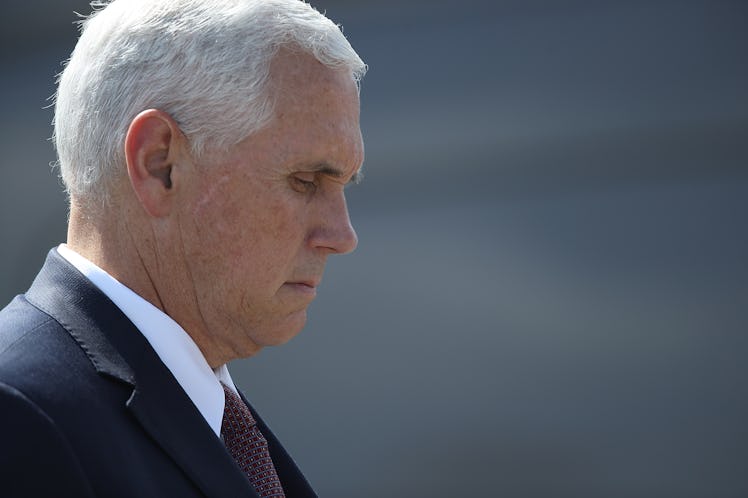
Dictionary.com's Shady Tweet About Mike Pence Wins The Internet
When I was a child and I didn't know the definition of a word, I looked it up in a dictionary. It was a whole ordeal: getting the dictionary, guessing how a word was spelled, and then combing through all of the other words to find it. To be honest, I can't remember the last time I used one, which is sad; typing a word into Google just doesn't provide the same level of satisfaction. Thankfully, though, dictionary companies have adapted to the internet age. Most are on social media, and some even have personalities, as evidenced by Dictionary.com's tweet about Mike Pence's "prayer" to Donald Trump.
It all started on Wednesday, Dec. 20 when The Washington Post published an analysis of a Cabinet meeting that took place that afternoon. According to the analysis, Vice President Mike Pence spent nearly three minutes of the meeting praising President Trump, who was seated directly across from him. In total, the VP offered 14 praises of the president, amounting to a compliment every 12.5 seconds. The analysis also notes that Pence praised the rest of the Cabinet, but only because, in his words, Trump "would have me also acknowledge the people around this table." Sounds like someone really wants a Christmas bonus, huh?
Following The Washington Post's cringe-worthy report, others jumped in to comment on the uncomfortable amount of flattery the vice president heaped onto the president, including Dictionary.com. The morning after The Washington Post tweeted their story, the reference site quote tweeted it and provided a helpful vocabulary lesson for everyone who was just as appalled as they were.
The word that they linked to is "sycophant." According to Dictionary.com, sycophant is a noun, and is defined as a "self-seeking, servile flatterer; [a] fawning parasite." Damn, tell us how you really feel. Synonyms for "sycophant" include "toady," "yes man," "flunky," "fawner," and "flatterer." I must say, I did not know the word "toady" existed until now, but I will absolutely be adding it to my vocabulary. Dictionary.com will be so proud of me.
The tweet received thousands of likes and retweets. However, not everyone was pleased with the diss. Some users slammed the reference site for getting too political.
Twitter user @nealdcarpenter threatened to switch over to Merriam-Webster as their primary reference site. Carpenter was unfortunately met with some bad news about their new resource of choice, which doesn't exactly love the current administration, either. Four days after President Trump's inauguration, the site tweeted out a definition of the word "claqueur," or someone who is hired to applaud at a performance.
This is not the first time that Dictionary.com has used the power of vocabulary to send a clear message about the current state of affairs. On Nov. 27, the site announced that its 2017 Word of the Year is "complicit." Dictionary.com credited the word's popularity to Ivanka Trump, who has been criticized for being complicit in her father's rise to power. (Ivanka has stated that she "doesn't know what it means to be 'complicit.'")
The White House has had its own battle with words recently. On Friday, Dec. 15, news broke that President Trump had "banned" the use of 7 words from use in documents relating to the Center for Disease Control's 2018 budget. The 7 words are "science-based," "evidence-based," "diversity," "entitlement," "vulnerable," "fetus," and "transgender." However, an unnamed CDC official told The New York Times that the measure was less of a censorship measure and more of a strategic measure in order to help the CDC continue to receive funding.
Check out the entire Gen Why series and other videos on Facebook and the Bustle app across Apple TV, Roku, and Amazon Fire TV.